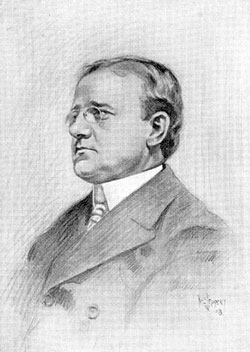|
Finley
Peter Dunne was one of the most influential voices of
the Irish community during these years. Dunne, who was
the son of Irish immigrants, began his career writing
about the relevant issues of the Irish in Chicago but
later moved to New York to write about national issues.
His Chicago columns had been enormously popular, but he
gained national recognition with his satirical depictions
of events related to the war. Most of his columns featured
as their protagonist an Irish bartender from a pub in
Chicago called Mr. Dooley who became the voice of many
working-class Irish. Dunne wrote about many other topics
but these parodies of the General’s speeches and war reports
gave him national success.
The cynical views of Mr. Dooley, the bartender, were all
written in a phonetic Irish- American dialect which was
then considered humorous. Dunne’s idea was to ‘make Dooley
talk as an Irishman would talk who has lived thirty or
forty years in America’ and ‘whose natural pronunciation
had been more or less affected by the slang of the streets’
(Fanning 1987: xvi). In the sketches, one becomes wan,
when - whin and the final /g/ is dropped on words
which end in ‘ing’. The Spanish names are transformed
as well, so Puerto Rico becomes Porther Ricky and Cuba
is also given an extra syllable to imitate an Irish language
pronunciation and turns into Cubia. This Hiberno-English
had a long tradition in English and Irish writing and
in the US context, ‘writers from the WASP mainstream throughout
the nineteenth century made full use of the brogue to
help create derogatory pictures of the alien immigrant
hordes’, which ‘were part of the new wave of nativism
that swept America in the nineties against the “new immigration”’
(Fanning 1987: xvii). However, Dunne’s mimesis of a working
class Irishman is not meant to be offensive because “he
used the brogue in new and salutary ways” (Fanning 1987:
xix). Mr. Dooley’s humorous naïveté conceals
the gravity of the issue he confronts. Dunne’s subversion
of English and the conversational tone of the article
undermines the serious content of the subjects written
about and “the expression of social consciousness … would
never have been printed unless they had been written in
dialect’ (Ellis 1938: xxii).
The
Threat of an Anglo-American Alliance: Irish opinion on
the possibility of an English connection to the war
The traditional antagonism of these Irish American communities
towards England put them opposition to US/Anglo opinion
which supported intervention against Spain. Their first
reaction was not to fight Spain because the Spanish government,
which was also Catholic, had traditionally been an ally
of Ireland. However, because of their own experiences
of colonialism they also understood that these Islanders
desired and fought for independence. ‘The contradictory
impulses in the hearts of Catholic Americans - of sympathy
for Cuba’s insurgency, and identification with Spain’s
Catholicity, - might [have] distanced them from the
current of popular passion’ (Doyle 1976: 165). Many of
these Irish were loyal citizens who had fought for the
US army but also recalled their own aspirations towards
independence. Some of their resentment surfaced as the
Irish saw support for the US in Cuba, the Philippines
and Puerto Rico, but not in Ireland.
Thus,
there were three positions (that intersected and diverged
on various levels) that these Irish-Catholics supported:
pro-Spanish, pro-Islander (Puerto Rico, Cuba, Philippine)
and/ or pro-US. As Hearst and Pulitzer were producing
large amounts of anti-Spanish propaganda at the end of
1897 and the beginning of 1898, the Irish New York/Irish
newspaper editors found themselves in an uncertain position.
They were not eager to enter into war with Spain because
Spain’s decline might help maintain England’s military
supremacy and would give the appearance that the US supported
England’s colonial policies. There was also a great deal
of trepidation in the community that the United States
would alienate its other European allies. Thus, the pre-War
coverage of The Irish World and The Irish-American
primarily consisted of connecting the Spanish Caribbean
problem with England. One of these links is explained
in this letter to the editor of the Irish World
from 15 January 1898.
Employing her usual cunning arts, England is working
hard through her agents here to defeat the settlement
of the Cuban question by the establishment of home rule
in Cuba. What does it matter to her that prolonging the
insurrection means the prolonging of the hunger and nakedness
and destitution of the poor Cubans, the continued devastation
of the island and the further sacrifice of human life?
With Cuba governing herself, developing her resources,
advancing on the path to returned prosperity which has
been opened to her by the liberal ministry of Spain discontented
Jamaica seeing her Spanish neighbor enjoying the advantages
of self-government might again attempt to shake off the
English yoke […] and the other British West Indian Islands
might follow in her lead.
A Home Ruler.
As
this reader points out, pro-war advocates ignored the
fact that Cuba and Puerto Rico had already been given
limited autonomy by Spain with the Carta Autonómica
since November of 1897.
Both
newspapers also printed several small articles which described
the Spanish warships coming to the Caribbean which tempered
the daily reports of Spanish troop build up in the mainstream
press. However, for Ford and Meehan, the threat of an
Anglo-American Alliance was the issue that deserved daily
front-page coverage. They were concerned about a US/British
agreement that would tentatively facilitate the use of
each other’s ports and canals in Asia and in Central America
in case of war. [2]
The Irish editors feared that the US government would
align itself with the English and support colonial policy
by linking it to US interests. On 15 January 1897, The
World referred to an editorial in The London
Spectator ‘Boasting of American Alliance’ which ‘threatens
Europe with the Whole Anglo-Saxon Race, United and Resolved’
and was the beginning of a series of articles strongly
denouncing the Alliance.
|

